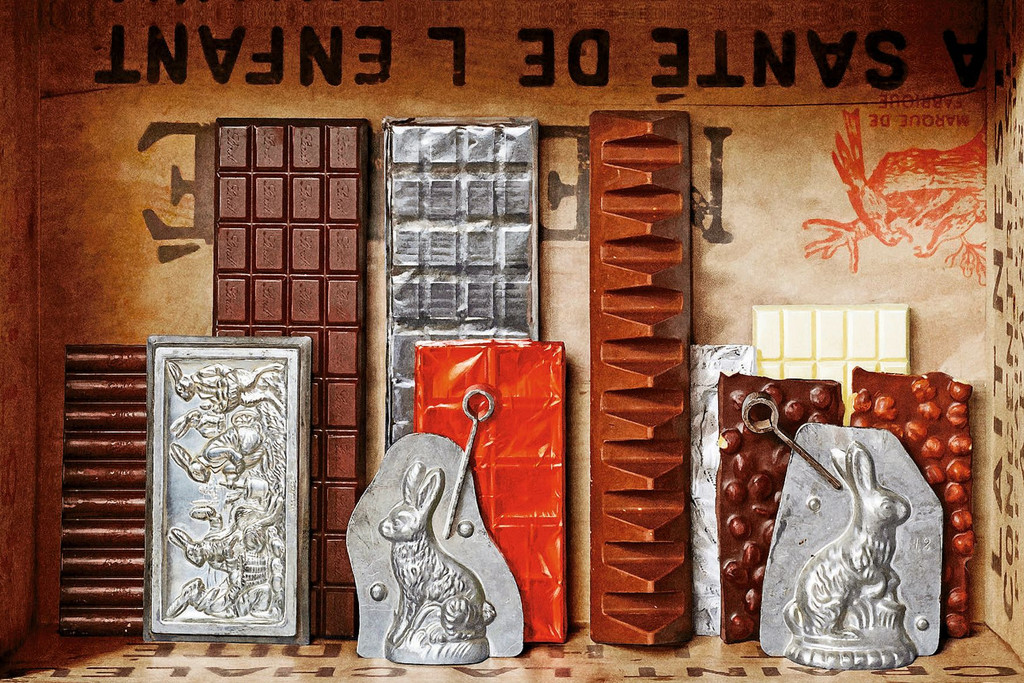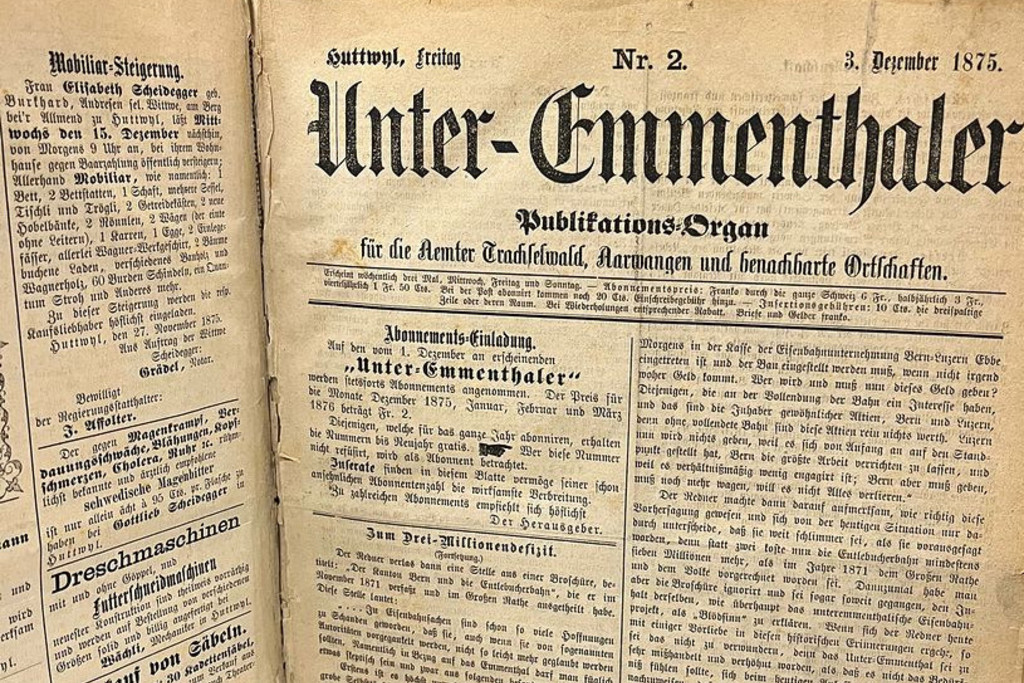“Administrative justice is one of the most appalling things you can imagine.” That was the opinion of an observer in 1939, who was widely quoted by the Independent Expert Commission (IEC) eighty years later: Bernese writer and reformer, Carl Albert Loosli. While criminals had a right to a trial, the reality was very different for people who were interred by the welfare authorities and other administrative bodies, he complained. Swiss institutions contained “state slaves abandoned to the whims of the authorities”. And the most astounding aspect: “Nobody cared.”
Loosli, the illegitimate son of a farmer’s daughter, was admitted to a juvenile correction facility as a young man. However, critical voices such as his clashed with the system for a long time. It was not until 1981 that the cantons repealed their administrative detention laws and the federal government revised the Civil Code. In the meantime, the social welfare system had professionalised, and society had become more liberal after 1968. However, the decisive factor was international pressure. Switzerland’s practice of depriving younger and older adults of their liberty at a stroke of the pen was incompatible with the previously ratified European Convention on Human Rights.
A “house of the other Switzerland”
Innocent victims who had spent time in jail were not rehabilitated. They also initially kept silent out of shame. “We dealt with the stigma of having spent time in a house of correction, but we were never criminals,” says Ursula Biondi. As a young woman the now 69-year-old was “administratively detained” in Hindelbank prison for re-education, as it was known in bureaucratic terms (see page 14). After the turn of the century, some courageous individuals, including Biondi, began to tell their stories. The media showed interest, and the topic found its way onto the political agenda. Between 2011 and 2016, there were two federal apologies, a Rehabilitation Act and a parliamentary resolution to organise a solidarity contribution for victims of all compulsory social measures. Besides administrative detainees, former contract children, institutionalised children and people who were forcibly sterilised demanded recognition of and redress for their suffering (“Swiss Review” 5/2018).
The Federal Council appointed an independent expert commission (IEC)to examine the administrative detentions in particular. More than thirty researchers were involved in the work. After four years’ work, the commission has published ten volumes in the last few months, including portraits of victims. This autumn they presented their final report and recommended further rehabilitation measures, ranging from additional financial payments to the victims through to the suggestion that a House of the Other Switzerland be set up as a place to raise awareness about these processes. The Swiss Justice Minister, Karin Keller-Sutter, accepted the recommendations. A decision also needs to be made on whether to extend the elapsed deadline for the solidarity contribution of 25,000 francs per person. This could see further victims making contact, along with those who live abroad and have not so far lodged a claim.
Repression in the constitutional state
The Expert Commission’s report contains four hundred pages of historical knowledge, and it holds a mirror up to the country. There is no other way to put it: until recently, Switzerland was actually an uncomfortable, even repressive place for the marginalised, the poor and non-conformists in society. There was a real second class and very few people were concerned by it. In a nutshell, the most important findings of the IEC are as follows:
- At least 60,000 people were administratively detained in 650 institutions in the 20th century. The number is higher than expected. Locking people up without a criminal conviction was not just an aberration of Swiss law; there was an actual system.
- The lower class in particular attracted the attention of administrative justice: the poor and the marginalised without permanent employment, social or family networks. However, those who were part of minority groups such as the Yenish were also detained, along with increasing numbers of rebellious young people after the Second World War.
- The decision to institutionalise was made by militia bodies: municipal councils, communal welfare committees and legal guardians. Tradespeople, housewives and bookkeepers all decided the fate of their fellow citizens in the evenings after work. Regional councillors and government officials were also involved. The step was justified by welfare and educational goals, or as a means to protect society. Moral assessments and traditional gender images were prevalent in the judgements. Men, who made up 80 per cent of the detainees, were accused of being work-shy and alcoholics; women were accused of licentiousness.
- Some of the many institutions in Switzerland had multiple purposes, which resulted in administrative detainees living in jails under the same roof as convicted criminals. Detainees were also admitted to forced labour facilities, labour colonies, reform schools, alcohol rehabilitation facilities, and workhouses. In the underequipped, badly supervised institutions, men had to do physical labour outside, while women were put to work in the household. Forced labour was either badly paid or not paid at all.
- The life-changing experience of institutionalisation also affected victims after they were released, often for the rest of their lives. Some suffered a nervous breakdown, while others emigrated. Some of them are still living in precarious conditions to this day. The authorities did not succeed in their goal of integrating “vulnerable persons” into society. The detainments actually increased the problems and marginalisation.
Unjust even back then
From today’s perspective, the attacks on personal freedom seem extreme; the welfare measures brutal. However, these were different times and the detainments were based on laws. Did they only become unjust with hindsight? Not according to the Commission. The detainment laws were leveraged on applicable laws and constitutional principles. People were often detained indefinitely, not listened to, often locked up without any legal ruling; in many places, there was no possibility of legal recourse to an independent court. The laws were also vague, which allowed the authorities to interpret them flexibly. Initially, the admissions to institutions were a cheap way for the state to manage the poor. However, over the course of the 20th century, they became instruments of social control. Throughout the country, people knew that whoever strayed from the path of common decency risked losing their liberty. It was not only the authorities who were actively locking up people. The researchers also determined that the measures were often prompted by family, neighbours, priests or teachers. They talk of “marginalisation practices that were deeply rooted in Swiss society”.
This is probably another reason why the detainment laws lasted so long. Switzerland’s social-political backwardness also played a part: supportive social insurance benefits were introduced to the Confederation later than in other European countries. Whatever the case, it is now officially time to reconcile the self-image of Switzerland – a country of geraniums, prosperity, freedom and direct democracy – with its other side. The remembrance work will be important, says IEC member Thomas Huonker who was one of the first historians to research the forced interventions. He emphasises: “Just as the wonderful story of Wilhelm Tell is retold over and over, the murky chapter of Switzerland’s abusive administrative care measures also has to be retold time and again”.
Fight for justice
Ursula Biondi was 17 years old when she was sent to Hindelbank prison. She had not committed any crime. Rather she was admitted by the Zurich Guardianship Department to a “closed reform school” because she had fallen pregnant as a minor. The fun-loving girl had previously been put into a girls’ home, which she ran away from several times. While still at home, she argued with her parents about going out, fashion and music. Her Italian father did not want to be viewed in a negative light by the authorities due to his citizenship application, so her parents agreed to a second placement for their daughter. They did not know that the “reform school” was a women’s prison that also housed criminals. Ursula was not able to get an education there. When she gave birth to her son, the authorities took him away and forced her to give him up for adoption. But she fought back and her baby was returned to her three months later. After a year in Hindelbank, where she was forced to work in the laundry, she was released in 1968. She moved to the anonymity of Geneva, had a family, worked in the IT department of a UN organisation and in the social field. “I was fortunate,” she says, “but that was hard-earned”. Biondi was severely traumatised. The fear of being exposed as a former Hindelbank inmate worried her for a long time. The injustice that she suffered haunted her. Biondi published her life story in 2002; it was picked up by the magazine “Beobachter”. She has been closely involved in the appraisal and redress of the “administrative detainments” for years. The term is belittling, she warns: “It hides a horrific cruel bureaucratic arbitrariness.” She sees the report of the expert committee as valuable. But one thing still worries the dedicated campaigner who was awarded an honorary doctorate in 2013 by the University of Fribourg. Due to the extremely late rehabilitation of the former “detainees”, the following generation has never known just what freedoms they had to fight for. “We were still sanctioned with prison for ways of life that are now widely accepted,” says Biondi who gives talks at schools so that people today remain vigilant against official arbitrariness.
Flight to the foreign legion
Peter Paul Moser was 21 years old when he was administratively detained in 1947 by the Grisons’ guardianship authority in the Herdern labour colony, canton of Thurgau. The young man did not understand the drastic measure; he had been working as a showman’s assistant and before that in a factory. As he was of Yenish origin, the authorities had been on his trail for some time. As a small child, the Pro-Juventute aid organisation Kinder der Landstrasse had separated him from his family and placed him in an orphanage. The goal was to turn the children of travelling folk into settled citizens. Later, his guardian, aid worker Alfred Siegfried, placed him in a foster family on a farm. Siegfried was a convicted paedophile, which highlighted the unbelievable double standard. In his three-volume autobiography, Moser later wrote: “Separation from one’s family heralded the start of the persecution of a member of an ethnic minority: attacks on the human sphere, discrimination, loss of freedom, detentions, admission to labour colonies, through to deprivation of liberty in a closed institution with the intention of destroying an entire ethnic group.” With the help of his employer, he initially escaped internment in 1947. Out of fear, he crossed the Swiss border in Geneva and applied to join the Foreign Legion in Annecy, France. The police returned him to Switzerland, where the authorities again admitted him to the labour colony. However, Moser ran away again and got a job in a machine factory. On the way there, his guardian had him arrested and transported to Bellechasse Prison in the canton of Fribourg. He describes the regime there as inhuman. After he was discharged from the prison, his guardian placed him on a farm and forbade him from marrying. It was not until the 1950s that Moser was able to escape their clutches and start a family. Later, he got involved in the association Naschet Jenische for the appraisal and redress of the systematic removal of the children of travelling folk. Moser lived to hear the apology to the Yenish folk given by the Federal Council in 1986; however, not his own rehabilitation as an administrative detainee. He passed away of a heart attack at the age of 77 in 2003.
The ten volumes of the Expert Commission are available free of charge online: www.uek-administrative-versorgungen.ch














Comments
Comments :
Ce qui veut dire que je dois dire que la Suisse est un pays magnifique ? Où tout baigne dans l'huille ! Que les montagnes sont belles, etc.
J'ai lu cet article, je suis encore sous le choc. Moi, qui vis à l'étranger depuis une cinquantaine d'années... je sais bien que la Suisse n'est pas au-dessus de tout soupçon (Jean Ziegler), mais après avoir lu cet article... Désolé, mais je ne suis pas fier d'être suisse.
In was für einem Märchenland bin ich aufgezogen worden!
Ich bin heute, nach all den Jahren immer noch geschockt und traurig. Die Zeiten zwischen den Weltkriegen waren hart, aber das ist in keinem Fall eine annehmbare Erklärung für solche unmenschliche Methoden!
Ich bin echt froh, diesen Artikel aufgefunden zu haben. Vielleicht finde ich auf diesem Weg einen Ansprechpartner?
Puis, plus tard, en tant que policier, pour avoir dû conduire certains adolescents, ou même adultes "réfractaires au système", dans des institutions où ils étaient sensés être remis sur le droit chemin!
Il est certain que glorifier nos ancêtres fondateurs et montrer au monde entier comment il faut s'y prendre pour faire vivre en bonne intelligence quatre régions linguistiques, ne suffit plus pour nous donner bonne conscience.
Regardons bien en face tous les comportements scandaleux qui ont émaillé l'Histoire de notre pays, puis qui ont conduit tant de jeunes et moins jeunes à être privés de leurs droits fondamentaux!
Wir können nur hoffen, dass von Fehlern gelernt wird, und sich Gleiches nicht wiederholt.
Couldn't stop reading your report.
And this was going on under my nose for 25 years while living in Switzerland. Never spoken about, non-existent conversation at the table. Who knew? Repulsive and shameful. How dared they?
Let us be sure not to forget and not let it happen again.
On pourrait renvoyer aussi au beau et tragique livre-témoignage de Nelly Schenker, "Une longue, longue attente. Mes souvenirs", paru en français aux éditions "Quart-Monde" en 2018. Titre original allemand :"Es langs, langs Warteli für es goldigs Nüteli. Meine Erinnerungen", edition Gesowip, Bâle, 2014.
L'information honnête: une qualité suisse ?
Der Bericht der Unabhängigen Expertenkommission zeigt endlich das ganze Ausmass dieser unmenschlichen Praxis, und es läuft mir kalt den Rücken herunter, wenn ich das lese. Und dass die Gesetze erst 1981 geändert wurden - wohl eher unter Druck von Aussen (Unvereinbarkeit mit der Europäischen Menschenrechtskonvention)- zeigt, dass es selbst in den Achtziger Jahren noch wenig Unrechtsbewusstsein gab.
Da hat es noch viele Mutige gebraucht, um dieses Unrechtssystem zu beenden und nun - Jahrzehnte später - wieder, um es dem Vergessen zu entreissen. Von diesen Menschen bin ich tief beeindruckt.
Note : C'est rare de trouver des fautes dans vos articles, mais en voici une belle : La honte les rendaient muettes, elles aussi.
(Dans La «Maison d’une autre Suisse»)
Au moins, il faut saluer ceux qui ont travailles pour actualiser notre memoire historique recente. Plus ambigu est " pick sous" qui traine pour indemniser les victimes. Decidement les mauvaises habitudes persistent...
Au moins, il faut saluer ceux qui ont travailles pour actualiser notre memoire historique recente. Plus ambigu est " pick sous" qui traine pour indemniser les victimes. Decidement les mauvaises habitudes persistent...
Je félicite votre revue pour sa parution.
Ma vision idyllique de la Suisse s’est pourtant quelque peu
écornée , moi qui était si fière de ma naturalisation...
Isabelle Lescure, citoyenne suisse depuis 2016
Il y a encore lieu d'être fière d'un pays qui accepte volontairement de se pencher sur les pans peu glorieux de son passé et de les accepter.
Cordialement,
David
Un grand Merci aux autorités d'avoir institué cette commission d'enquête en 2014 dont les membres ont vraiment réalisé un travail remarquable de réhabilitation si primordial pour les victimes.
Quant aux bourreaux ...
Je regrette juste de découvrir après coup l'existence des expositions itinérantes 2019.
Da haben sogenannte "Beamte" wie die SS ohne Waffen und mit Willkühr gehandelt und die Justiz und "Regierung" hat Beifall geklatscht! A la Mittelalter, und das bis ins späte 20. Jahrhundert!
Die Schweizer Regierung MUSS diese scheussliche Gemeinheit letztlich finanziell und mit öffentlicher Entschuldigung, die Betroffenen UND deren Nachkommen entschädigen!! Kein Wenn und Aber, solange der Staat Geld an halbbankrotte Firmen und Länder nachwerfen kann, ist das ein Tropfen auf ein scheussliches Kapitel der Schweiz!
Zusammen mit den jüdischen Bank- und Kunstvermögen, die die offizielle Schweiz jahrzehnte lang verschwiegen haben, gehört dieser Skandal zu den schlimmsten der Schweiz.
Wir sollten uns auch mal über unsere Überheblichkeit und Arroganz gegenüber solchen Misstaten kritisch Gedanken machen. Und, jetzt gegenüber den Betroffenen wirkliche Kompensationen leisten, auch wenn sie nur noch materiell wirken können.